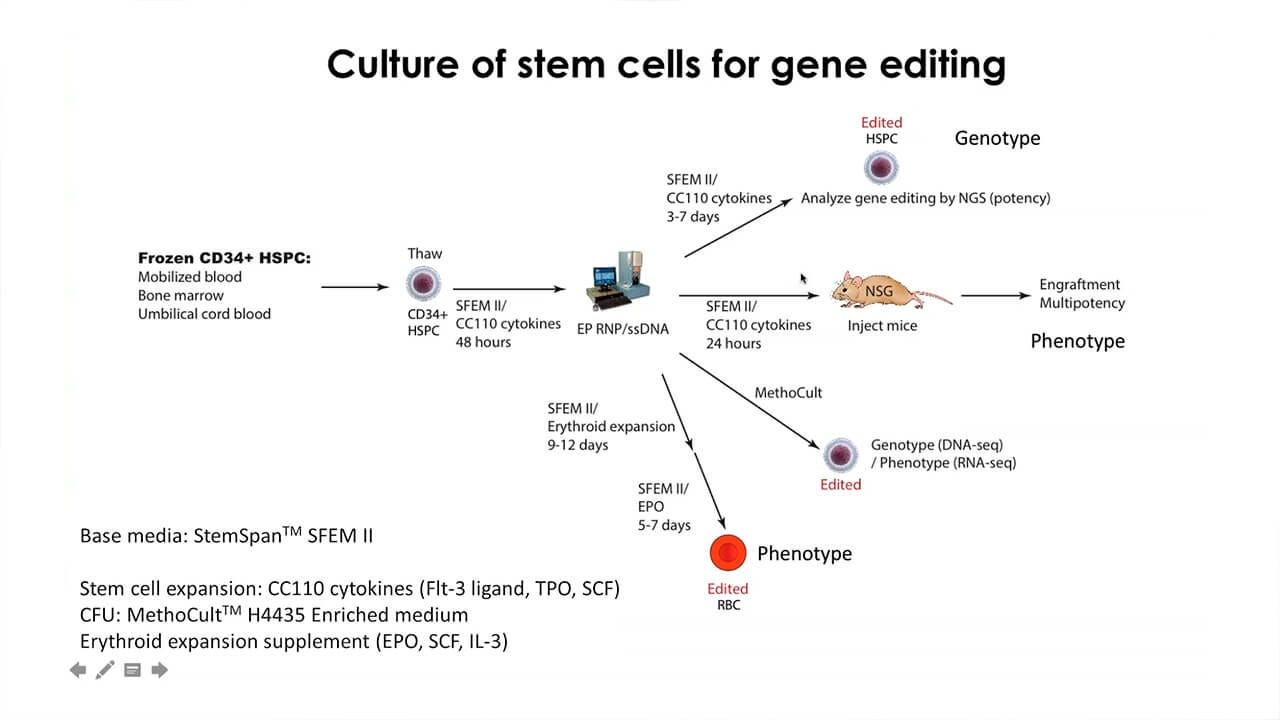Hematopoietic Cell Therapy
Hematopoietic stem cells (HSCs) have long been used to provide life-saving treatments for patients with malignant and non-malignant hematological disorders. While these treatments originally took the form of conventional bone marrow transplants, more recent breakthroughs in the field have provided cell therapy researchers with methods to correct genetic mutations in a patient’s own cells for autologous HSC transplantation.
We have compiled a selection of scientific resources to help you on your way in the complex and exciting field of hematopoietic cell therapy.
CRISPR-Cas9 Editing of Hematopoietic Stem and Progenitor Cells
In this webinar, Dr. Mark DeWitt will discuss the use of gene editing techniques for hematopoietic stem and progenitor cells HSPCs. Topics he will include are:
- Delivery of gene editing machinery to target cells
- Homology-directed repair for precise editing
- Culture conditions required for efficient editing
- Levels of correction needed for the treatment of monogenic disorders, such as sickle cell disease
-
 Applying the ISSCR Standards for Research CourseLearn to confidently apply the ISSCR Standards for Human Stem Cell Use in Research to your human pluripotent stem cell-based projects.
Applying the ISSCR Standards for Research CourseLearn to confidently apply the ISSCR Standards for Human Stem Cell Use in Research to your human pluripotent stem cell-based projects. -
 The CFU Assay: In Vitro Functional Potency Assessment for Hematopoietic Stem and Progenitor CellsThe colony-forming unit (CFU) assay remains the only in vitro assay that provides a correlative assessment of hematopoietic stem and progenitor cell (HSPC) engraftment potential in vivo. For many years, regulatory bodies have recommended functional assessment and the CFU assay for labs working with cellular therapies or transplantable products derived from HSPCs. Recent updates from regulatory bodies such as FACT underscore the crucial role of the CFU assay in these workflows, particularly after any processing step, such as cryopreservation, that may impact the functional properties of HSPC products. <br><br> In this webinar, Selena Hallahan introduces the utility of the CFU assay for functional assessment of hematopoietic cell products and ∫£Ω«∆∆Ω‚∞Ê Technologies‚Äô comprehensive portfolio of reagents, training, and services designed to support high-performing and standardized workflows for hematopoietic cell therapy products.
The CFU Assay: In Vitro Functional Potency Assessment for Hematopoietic Stem and Progenitor CellsThe colony-forming unit (CFU) assay remains the only in vitro assay that provides a correlative assessment of hematopoietic stem and progenitor cell (HSPC) engraftment potential in vivo. For many years, regulatory bodies have recommended functional assessment and the CFU assay for labs working with cellular therapies or transplantable products derived from HSPCs. Recent updates from regulatory bodies such as FACT underscore the crucial role of the CFU assay in these workflows, particularly after any processing step, such as cryopreservation, that may impact the functional properties of HSPC products. <br><br> In this webinar, Selena Hallahan introduces the utility of the CFU assay for functional assessment of hematopoietic cell products and ∫£Ω«∆∆Ω‚∞Ê Technologies‚Äô comprehensive portfolio of reagents, training, and services designed to support high-performing and standardized workflows for hematopoietic cell therapy products. -
 Courteney LaiCourteney Lai describes her work in the Humphries' lab studying leukemic stem cell function using models of acute myeloid leukemia
Courteney LaiCourteney Lai describes her work in the Humphries' lab studying leukemic stem cell function using models of acute myeloid leukemia -
 David Knapp, PhDDr. David Knapp shares his work examining how growth factors affect the survival, proliferation, and maintenance of cells of the cord blood HSC compartment
David Knapp, PhDDr. David Knapp shares his work examining how growth factors affect the survival, proliferation, and maintenance of cells of the cord blood HSC compartment -
 Daniel Gray, PhDDr. Daniel Gray describes his work studying cell death and the potential applications in drug development for immune disorders
Daniel Gray, PhDDr. Daniel Gray describes his work studying cell death and the potential applications in drug development for immune disorders -
 Serum-Free Expansion of CD34+ Cells with SFEM II and UM729Explore the use of StemSpan‚Ñ¢ SFEM II medium, StemSpan‚Ñ¢ CD34+ Expansion Supplement and small molecules UM171 or UM729 to enhance expansion of HSPCs
Serum-Free Expansion of CD34+ Cells with SFEM II and UM729Explore the use of StemSpan‚Ñ¢ SFEM II medium, StemSpan‚Ñ¢ CD34+ Expansion Supplement and small molecules UM171 or UM729 to enhance expansion of HSPCs







